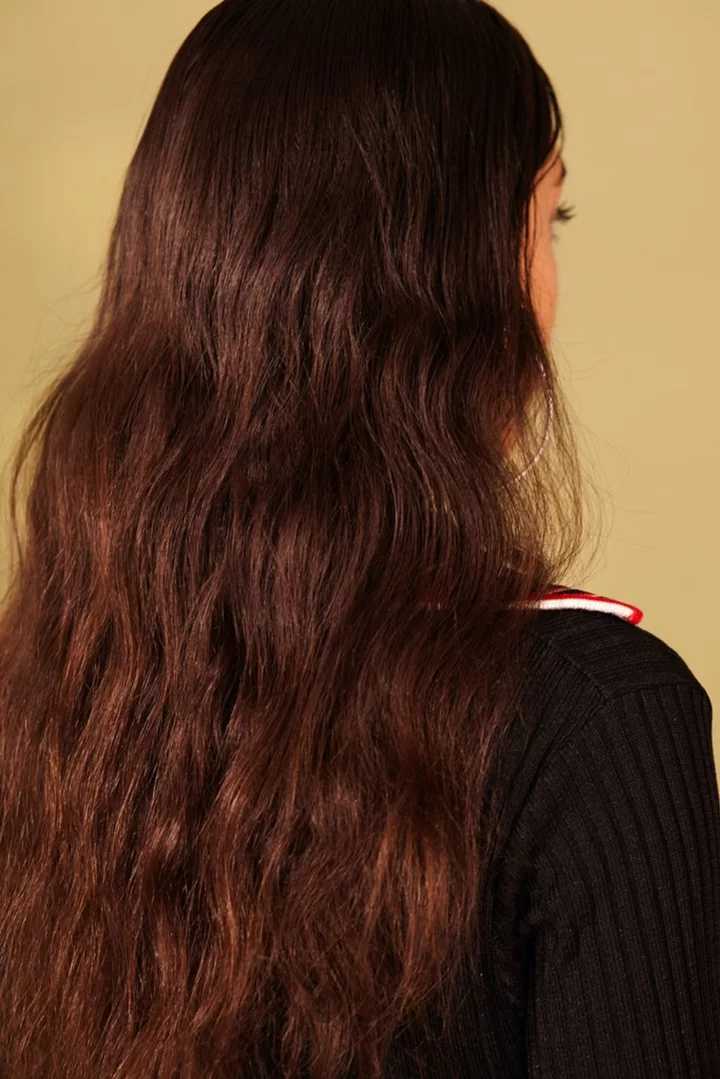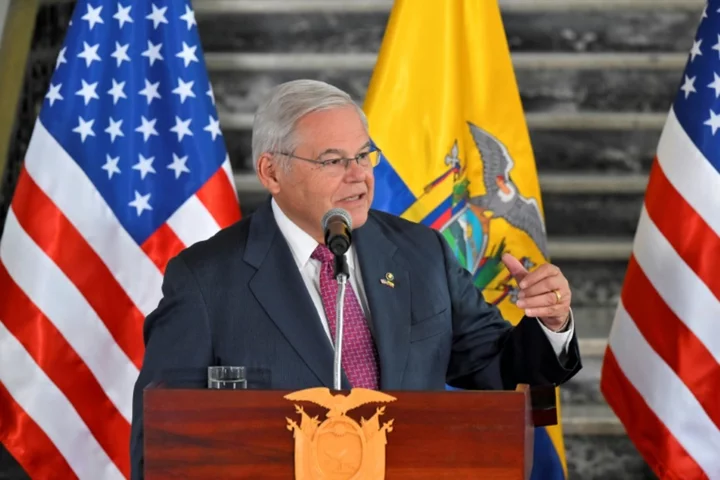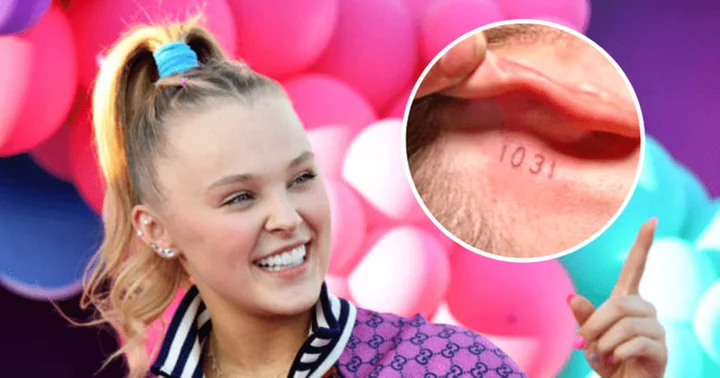Whether your hair grows at a snail’s pace or you’re trying to treat sparse patches, it’s likely that in your quest for thicker, longer hair, you will have come across dozens of articles and tutorials extolling the virtues of many supposedly impressive ingredients.
There’s folic acid (also known as vitamin B9), castor oil (now found in countless drugstore hair treatments), and TikTok’s new favorite, rosemary oil (apparently like Miracle-Gro for your hair). Just how many of these things are actually proven to work, and which ones rely solely on anecdotal evidence?
We looked to Hannah Gaboardi, trichologist at The Hair Growth Clinic, and Angela Onuoha, trichologist and cosmetic chemist, for their thoughts on the most googled oils and natural ingredients touted to make your hair grow thicker and faster.
What causes hair loss, thinning, and slow hair growth?
It’s totally normal to lose hair (we tend to shed 50-100 strands a day, according to the American Academy of Dermatology) and usually it’s nothing to be worried about — unless it’s getting you down.
Onuoha explains that stress is the number one cause of hair loss. “Stress causes your body to constantly be in survival mode,” says Onuoha, “and that has a long-term effect on your hair, since it isn’t prioritized by the body when it comes to survival.” But hair loss or thinning can often be a sign of a medical condition, such as alopecia areata (unpredictable patches of hair loss). Weight loss, iron deficiency, polycystic ovary syndrome (PCOS), and illness are just a handful of other causes of hair loss and thinning. It’s best to visit your doctor or a registered trichologist for tailored advice.
Is rosemary oil good for hair growth?
On TikTok there are 119.6 million videos tagging #rosemaryoil, with the majority talking about it in relation to hair health and accelerated growth. Gaboardi says she “swears by” the ingredient for reducing hair fall, and lots of anecdotal evidence suggests that massaging rosemary oil into the scalp on a regular basis helps to fill out the hairline and encourages growth in sparse patches. But at the moment, it’s just that — anecdotal.
“So far [the benefits of rosemary oil for hair growth] has not been scientifically proven on humans,” says Onuoha, referring to a study on mice, where rosemary oil was used to speed up hair growth. Onuoha explains that there has been a human study, albeit with only 28 participants, each one of whom had a scalp condition called alopecia areata (an autoimmune disorder which results in patchy hair loss). Hair loss caused by alopecia areata is very different from other types of hair loss or slow growth so the findings were limited. “So far, when it comes to science, there is no proof,” says Onuoha.
@thehealthyhur The girls who get it GET ITTTTT #greenscreen #hairloss #rosemarywater #rosemaryoil ♬ Forever – LabrinthAll is not lost, though. It could be that the act of regularly massaging oil into the scalp is the catalyst that stimulates new hair cells. Gaboardi praises scalp massagers in particular. “You can use rosemary oil by massaging it into your scalp for five minutes and leaving it on for a minimum of 15 minutes,” she says. Gaboardi also likes rosemary oil for its antibacterial benefits for the scalp and hair. Plus, it can be very nourishing on dry hair. That’s why brands like Aveda, Mielle, and Flamingo Estate have infused it into shampoos. When it comes to clinical hair growth, however, the science just isn’t there.
DashDividers_1_500x100Is castor oil good for hair growth?
Castor oil is a vegetable oil derived from castor beans. It has highly moisturizing properties — particularly for natural hair, which tends to be drier — but Gaboardi and Onuoha agree that it will not stimulate hair growth. There is no scientific evidence to suggest otherwise, despite TikTok coming through with countless anecdotes. If your hair is very dry, Gaboardi says that occasionally using castor oil can help maintain its health, but the oil is notoriously thick and can create buildup, causing your ends and scalp to become greasy very quickly.
If you’re still swayed by the ingredient, try it in a pre-wash treatment designed to be used before shampoo to ensure the lather doesn’t strip your hair and scalp completely. Good options include Fable & Mane HoliRoots Hair Oil, Shea Moisture Jamaican Black Castor Oil Strengthen & Restore Hair Treatment Mask, and Philip Kingsley Elasticizer Deep Conditioning Treatment, all of which and condition hair deeply and are easily rinsed out.
DashDividers_1_500x100Are peptides good for hair growth?
Peptides are little proteins, and proteins can regenerate both skin and hair. There are lots of different peptides, some that work on the hair and some that are better for the skin. In haircare, you’re likely to hear buzz around copper peptides and pea protein in particular.
“Certain peptides fight inflammation,” explains Gaboardi. “When inflammation occurs on the scalp, it can impact the growth phase of your hair.” Some peptides can soothe this inflammation, nipping hair loss in the bud. Gaboardi recommends pea peptides in particular to help smooth the hair follicle and provide fullness, making hair soft and shiny. “Pea protein has essential vitamins and minerals, such as iron and calcium,” says Gaboardi, “which help boost hair quality and improve hair growth.” She adds that pea protein can help boost the production of keratin, which makes hair strong. Not only will this repair the hair, but it also promotes healthy new hairs and protects them from environmental aggressors like pollution and heat.
If you’re looking for products with hydrolyzed pea protein, try Philip Kingsley Density Thickening Protein Spray or Virtue Flourish Density Booster. Gaboardi is personally a fan of Ouai Scalp Serum, which features acetyl tetrapeptide-3, which studies conclude increases hair growth. Refinery29 editors also recommend The Ordinary Multi-Peptide Serum For Hair Density, which boasts multiple peptides and caffeine to boost hair density. The incredible reviews speak for themselves. With any of these products, make sure to follow the directions, as protein overload is a real thing that can cause hair to feel dry, heavy, and weighed down.
DashDividers_1_500x100Is argan oil good for hair growth?
Studies show that argan oil is effective at protecting hair from damage caused by environmental aggressors such as pollution and UV. It’s why you’ll spot the ingredient in so many hair products. But just like castor oil, there is hardly any data to suggest that it helps with hair growth.
For smooth, protected hair, opt instead for a leave-in conditioner with argan oil, such as Hask Argan Oil 5 in 1 Leave in Conditioner. If your hair needs more moisture, treat your strands (not your scalp) to something like OGX Renewing+ Argan Oil of Morocco Penetrating Oil, before styling or air-drying; it makes hair soft and smooth.
Onuoha agrees that using an oil to lock in moisture is the perfect way to give a nice coating to your hair, preventing damage. “It also makes the hair easier to manage,” she says, “and gives it an amazing shine. I personally love the Rhyme & Reason Argan Oil Smooth Finishing Serum because it’s super lightweight but so nourishing.”
DashDividers_1_500x100Is minoxidil good for hair growth?
You might’ve come across minoxidil in your hair growth endeavors. As it stands, this is one of the only scientifically proven ingredients to stimulate hair growth and, happily, it’s available in various pharmacies, as well as online. So what exactly is it? “Minoxidil is a vasodilator,” explains Onuoha, “and this means that it widens the blood vessels to deliver more oxygen-rich blood to the hair follicles.”
Onuoha adds that lots of people who are dealing with hair loss need more oxygen to the affected areas to stimulate hair growth. She says that minoxidil is used to spot treat areas of baldness or a receding hairline, since it stimulates those areas and slows down further balding. It’s the active ingredient in popular over-the-counter product Rogaine, which comes in the form of a solution and a foam.
DashDividers_1_500x100Is tretinoin good for hair growth?
Similar to the discourse around rosemary oil, tretinoin for hair growth has been especially trendy on TikTok. Recent studies have shown that tretinoin, a prescription form of vitamin A used to treat skin conditions like acne and uneven tone, may help enhance the effect of minoxidil used to promote hair growth. Tretinoin, being a potent and concentrated form of retinol, works to increase cell turnover. “We already know from using it on our face that retinol increases skin cell renewal,” Onuoha tells R29. “It could help other ingredients penetrate the scalp — that’s why that combination [claim] has been made. But I haven’t seen any studies showing that retinol will do that much to the hair strands.” The downside to using retinoids on and around the scalp is there’s a high risk of irritation, which could actually make hair loss worse. Instead, most trichologists recommend salicylic acid for gentle exfoliation.
DashDividers_1_500x100Is folic acid good for hair growth?
Gaboardi says that folic acid — also known as vitamin B9 — is necessary for hair health. Onuoha explains that it is found in our food, such as spinach, beans, peas, citrus fruit, liver, and grains. Unless you’re deficient in the vitamin, you’re probably getting enough from your diet. Hair growth supplements containing folic acid might help but they might not. “Everything that you’re adding to your diet will end up in your pee,” says Onuoha. “Your body only absorbs what it needs.” If you’re worried about deficiency, Onuoha suggests getting your bloodwork checked before self-diagnosing the condition of your hair using supplements.
DashDividers_1_500x100Is biotin good for hair growth?
The same goes for biotin (also known as vitamin B7). “There has been a huge trend for biotin in hair growth recently,” says Onuoha. “The funny thing is, I’ve never had a client who ended up having a biotin deficiency. In fact, humans rarely have it.”
Is washing your hair regularly good for hair growth?
Yes, using a shampoo regularly helps to keep the scalp clean. In turn, removing oil and debris from the scalp can promote hair growth. Onuoha agrees that starting off with good scalp health — and particularly a clean scalp — is key. “Since the scalp is the soil your hair grows on, you want it to be in the best healthy state,” she explains. Onuoha likes a simple, gentle cleanser, like Rhyme & Reason Nourish & Gloss Shampoo. “This contains hyaluronic acid, which is an amazing ingredient to keep the scalp moisturized and supple,” she says. If your hair is dry and damaged by heat, bleach, or dye, try a reparative or restorative shampoo, like Rhyme & Reason Repair & Restore Shampoo.
This story was originally published on Refinery29UK.
At Refinery29, we’re here to help you navigate this overwhelming world of stuff. All of our market picks are independently selected and curated by the editorial team. If you buy something we link to on our site, Refinery29 may earn commission.









